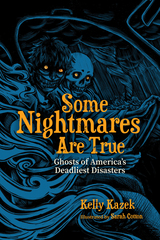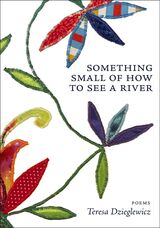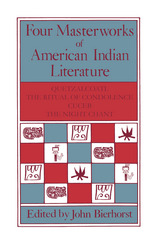
"This comparative application of the epic poetry tradition to Amerind literature is a scholarly success.... this book is a most noteworthy item in the field of American Indian studies, and is not to be missed by any serious devotee." --Library Journal
"Biehorst's introductions and notes are brilliant, thorough, and an important contribution to the scholarship on these works. His new translation of the Quetzalcoatl is also excellent." --Choice
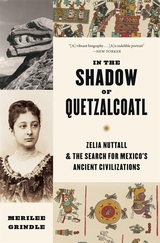
A New Yorker Best Book of the Year
A Foreign Affairs Best Book of the Year
“Grindle’s passionate book, including extensive research in Mexico, will ensure that [Zelia Nuttall] is never forgotten.” —British Museum Magazine
“[A] beautifully crafted biography.” —Foreign Affairs
“What a woman! And what a fabulous life to unearth. Zelia Nuttall was incredibly smart, determined, a divorced single mother in a man’s world, a great scholar, and an original thinker—yet today she’s completely forgotten. Merilee Grindle has dug deep into the archives and uncovered her fascinating story.” —Andrea Wulf, author of The Invention of Nature
The question of human origins took on a new urgency in the nineteenth century, as scholars began to look beyond the Bible to understand how different cultures and civilizations emerged. Zelia Nuttall was among the most accomplished of these scholars. A child of the San Francisco Gold Rush, Nuttall also had roots in Mexico City, where her mother was born. As a young woman, she threw herself into the study of Aztec customs and cosmology, eager to use the emerging sciences of archaeology and anthropology to prove that modern Mexico was built over the ruins of ancients.
Proud, prickly, and independent, Nuttall made the first accurate decoding of the Aztec calendar stone. She found pre-Columbian texts lost in European archives and made sense of their pictographic histories. Her work on the terra-cotta heads of Teotihuacán vaulted her into the highest echelons of her discipline. She was also a single mother who made ends meet by collecting artifacts for US museums. Such trade in sacred artifacts is today rightfully under scrutiny, but in her time, Nuttall was recognized as a vital bridge between Mexican and US anthropologists.
The first biography of Zelia Nuttall, In the Shadow of Quetzalcoatl captures the contributions and contradictions of a trailblazing woman and her intellectual milieu.
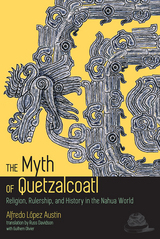
The Myth of Quetzalcoatl is a translation of Alfredo López Austin’s 1973 book Hombre-Dios: Religión y politica en el mundo náhuatl. Despite its pervasive and lasting influence on the study of Mesoamerican history, religion in general, and the Quetzalcoatl myth in particular, this work has not been available in English until now.
The importance of Hombre-Dios and its status as a classic arise from its interdisciplinary approach, creative use of a wide range of source material, and unsurpassed treatment of its subject—the nature and content of religious beliefs and rituals among the native populations of Mesoamerica and the manner in which they fused with and helped sanctify political authority and rulership in both the pre- and post-conquest periods. Working from a wide variety of previously neglected documentary sources, incorporating myth, archaeology, and the ethnography of contemporary Native Americans including non-Nahua peoples, López Austin traces the figure of Quetzalcoatl as a “Man-God” from pre-conquest times, while Russ Davidson’s translator’s note, Davíd Carrasco's foreword, and López Austin’s introduction place the work within the context of modern scholarship.
López Austin’s original work on Quetzalcoatl is a pivotal work in the field of anthropology, and this long-overdue English translation will be of significance to historians, anthropologists, linguists, and serious readers interested in Mesoamerica.
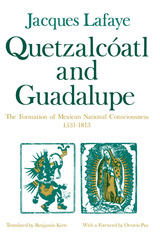
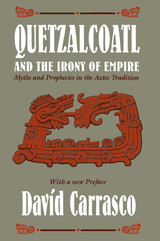
"This book, rich in ideas, constituting a novel approach . . . represents a stimulating and provocative contribution to Mesoamerican studies. . . . Recommended to all serious students of the New World's most advanced indigenous civilization."—H. B. Nicholson, Man
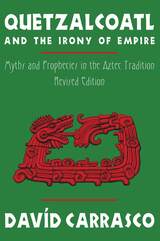
- American Anthropologist
"A must for both professional and serious non-professional students in Mesoamerica. Those who are interested in complex society and urbanism in general, as well as students of comparative religion, will find it stimulating. Most importantly, for anyone interested in the history of ideas, the book illuminates the tremendously powerful impact and role of a complex deity/mythico-historical figure in shaping one of the world's great pristine civilizations."
- Queen's Quarterly
READERS
Browse our collection.
PUBLISHERS
See BiblioVault's publisher services.
STUDENT SERVICES
Files for college accessibility offices.
UChicago Accessibility Resources
home | accessibility | search | about | contact us
BiblioVault ® 2001 - 2025
The University of Chicago Press


